Samsung Galaxy S9 review: a refined Android phone with excellent camera
Samsung has created a very premium and polished phone

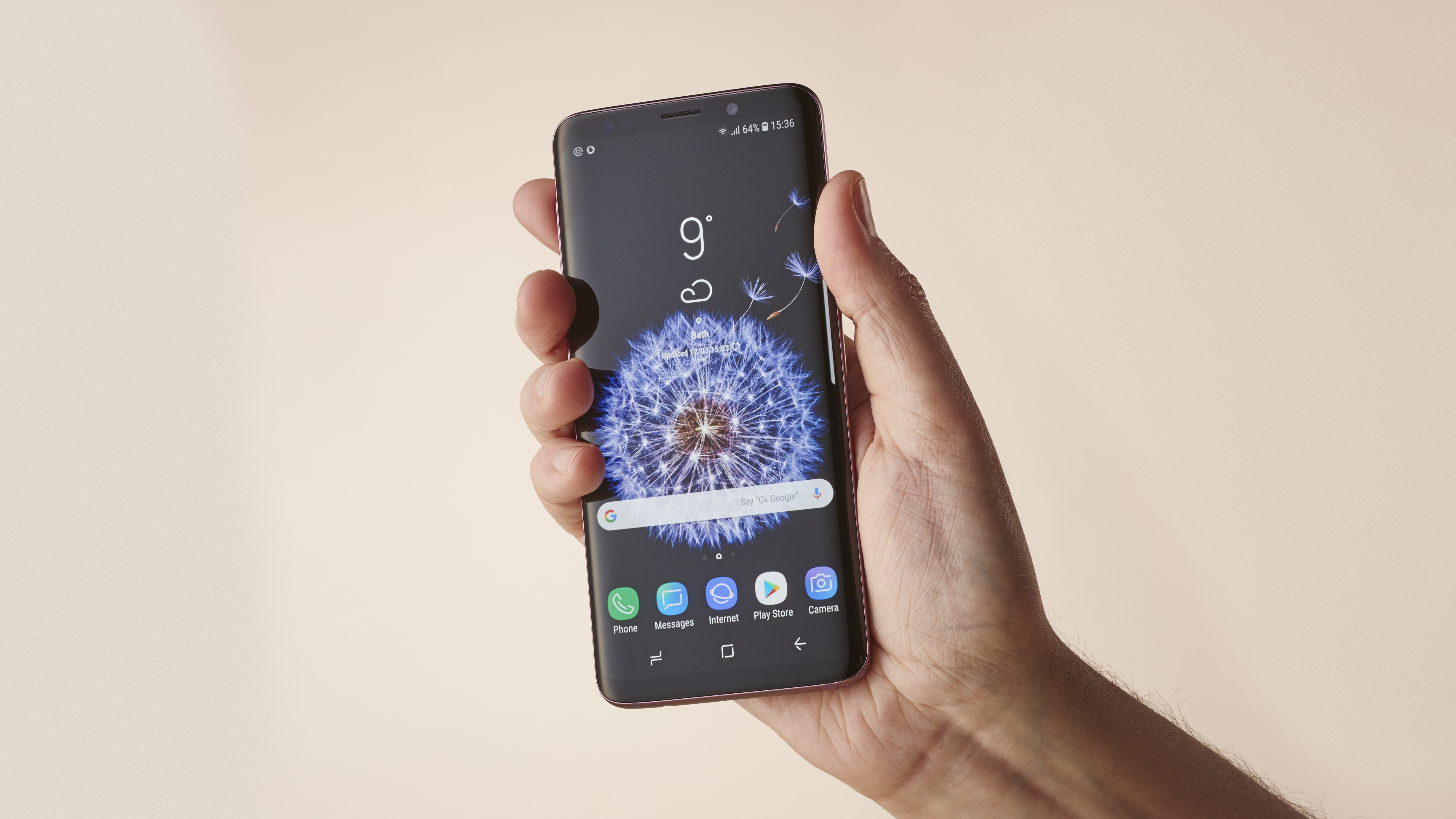
Viewed in snapshot, the Samsung Galaxy S9 is simply a refined version of last year's S8, with an almost identical hardware suite packed into that lush slab of metal and glass. However, look closer and you see that the Samsung S9 not only delivers a standout, party-piece camera system, but also a selection of innovative features and software that point towards a maturing of Samsung's approach to delivering a flagship Android experience.
-
+
12MP rear camera with dual-aperture technology
-
+
Still fabulous Super AMOLED 18.5:9 QHD+ screen
-
+
AR Emoji, while not perfect, are lots of fun
-
-
Similar specs to the Galaxy S8
Why you can trust T3

Samsung Galaxy S9 specs
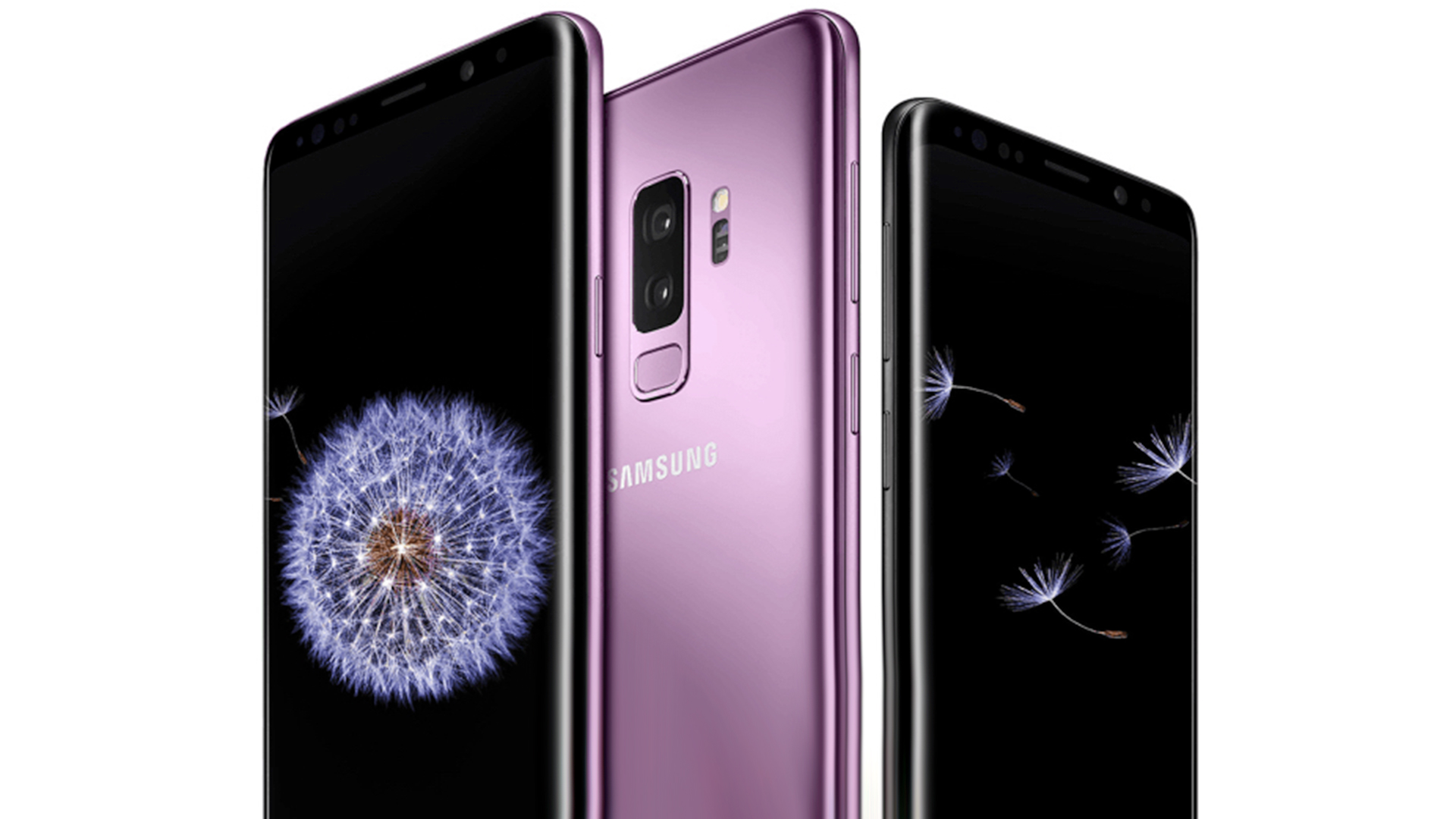
OS: Android 8.0 (Oreo)
Processor: Octa-core processor (2.8 GHz Quad + 1.7 GHz Quad)
Display: 5.8-inch Quad HD + Curved Super AMOLED, 18.5:9 (570ppi)
RAM: 4GB
Rear camera: Super Speed Dual Pixel 12MP AF sensor with OIS (F1.5/F2.4)
Front camera: 8MP AF (F1.7)
Dimensions: 147.7mm x 68.7mm x 8.5mm
Weight: 163g
Storage (internal): 64GB
Storage (external): MicroSD up to 400GB
Battery: 3,000mAh
The Samsung Galaxy S9 is, in terms of hardware and design, an iterative update of last year's Galaxy S8. The S9 features the exact same screen as last year's phone, the same amount of RAM and storage, the same capacity battery, and an almost identical design, too. And, the same is true for the S9 Plus (check out our Samsung S9 Plus review for details), too.
The Samsung Galaxy S9 is getting some astonishing discounts in the Cyber Monday sales, too, so if you are considering picking up the phone then this review is a great place to start your research.
Indeed, only the Samsung S9 range's 12MP dual-aperture rear camera system is legitimately leap-ahead new, which explains at least in part why Samsung has been so keen to push its "The Camera Reimagined" slogan in the marketing run up to the phones' release date.
- Samsung Galaxy S10 review
- Samsung Galaxy S9+ review
- Samsung S9 deals: all the best options
- Best Samsung Galaxy S9 cases
- Samsung Galaxy S9 vs Samsung Galaxy S7: is this the 2-year upgrade you've been waiting for?
However, Samsung's new camera system is, in many ways, the gateway to the S9's real new advancements and innovations, including a new upgraded version of Bixby (Samsung's AI assistant) with real-time object detection and recognition, AR Emoji (Samsung's version of Apple's Animoji), and Super slow-mo 960fps video recording.
Of course, Samsung's new flagship Android phone also comes with a pretty darn hefty price tag and, with the S8 now considerably cheaper on the market, it is only natural to wonder whether these more holistic, every-day-use features on top of similar hardware is worth the expense.
To discover whether this is a crippling blow or not to Samsung's 2018 Galaxy S8 read on.
Samsung S9 review: price, colours, and release date
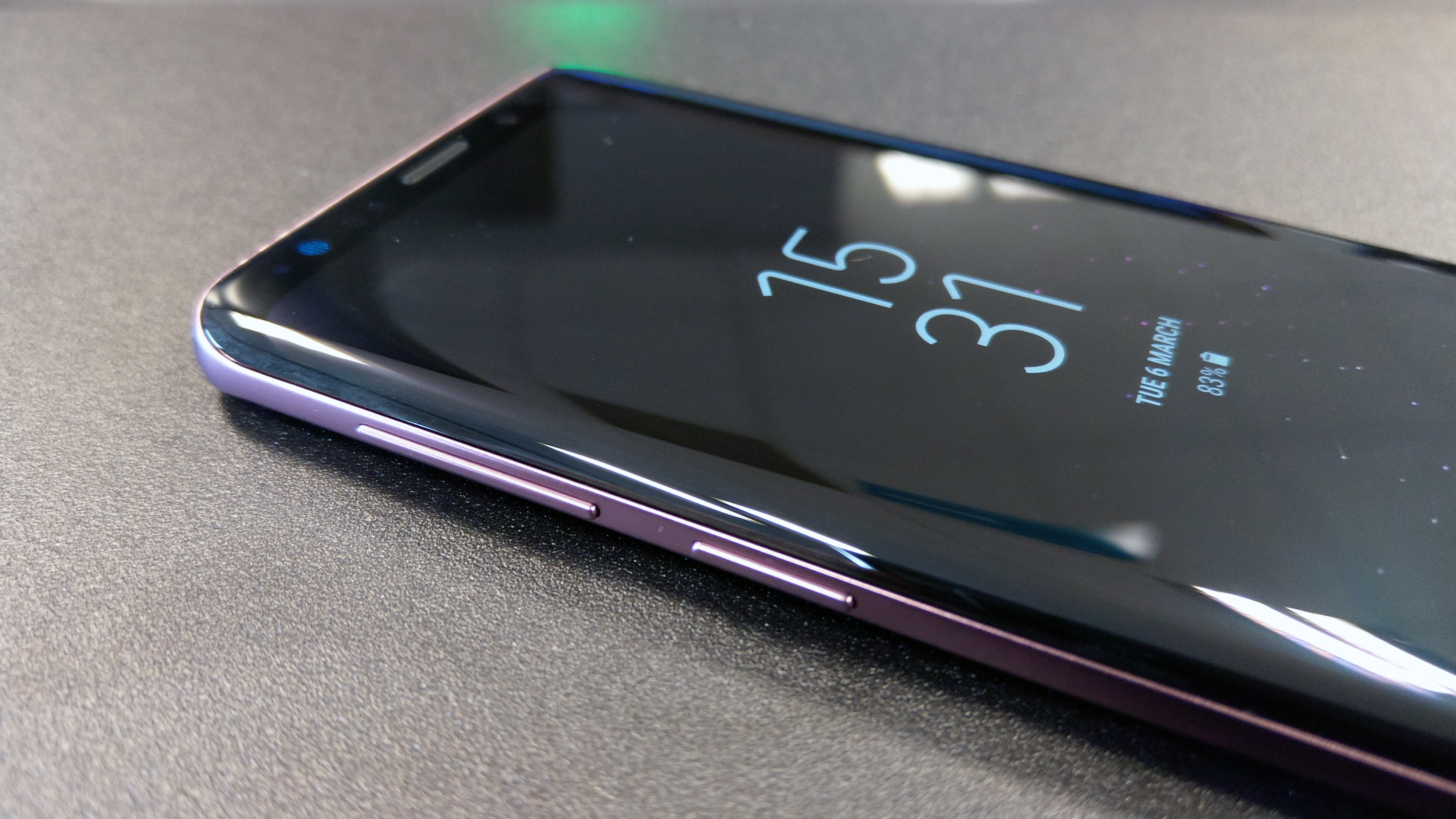
The Samsung Galaxy S9 is available in three colours: Lilac Purple (the colour we tested here), Midnight Black and Coral Blue.
The Samsung Galaxy S9 costs £739 to buy. The phone can be purchased directly from Samsung as well as select retailers.
On contract the Samsung Galaxy S9 can be picked up with 16GB of data and unlimited minutes and texts for £59 per month (£29 upfront cost) over at Vodafone.
Check out our Samsung Galaxy S9 deals page for the best S9 prices!
Samsung S9 review: design and build quality
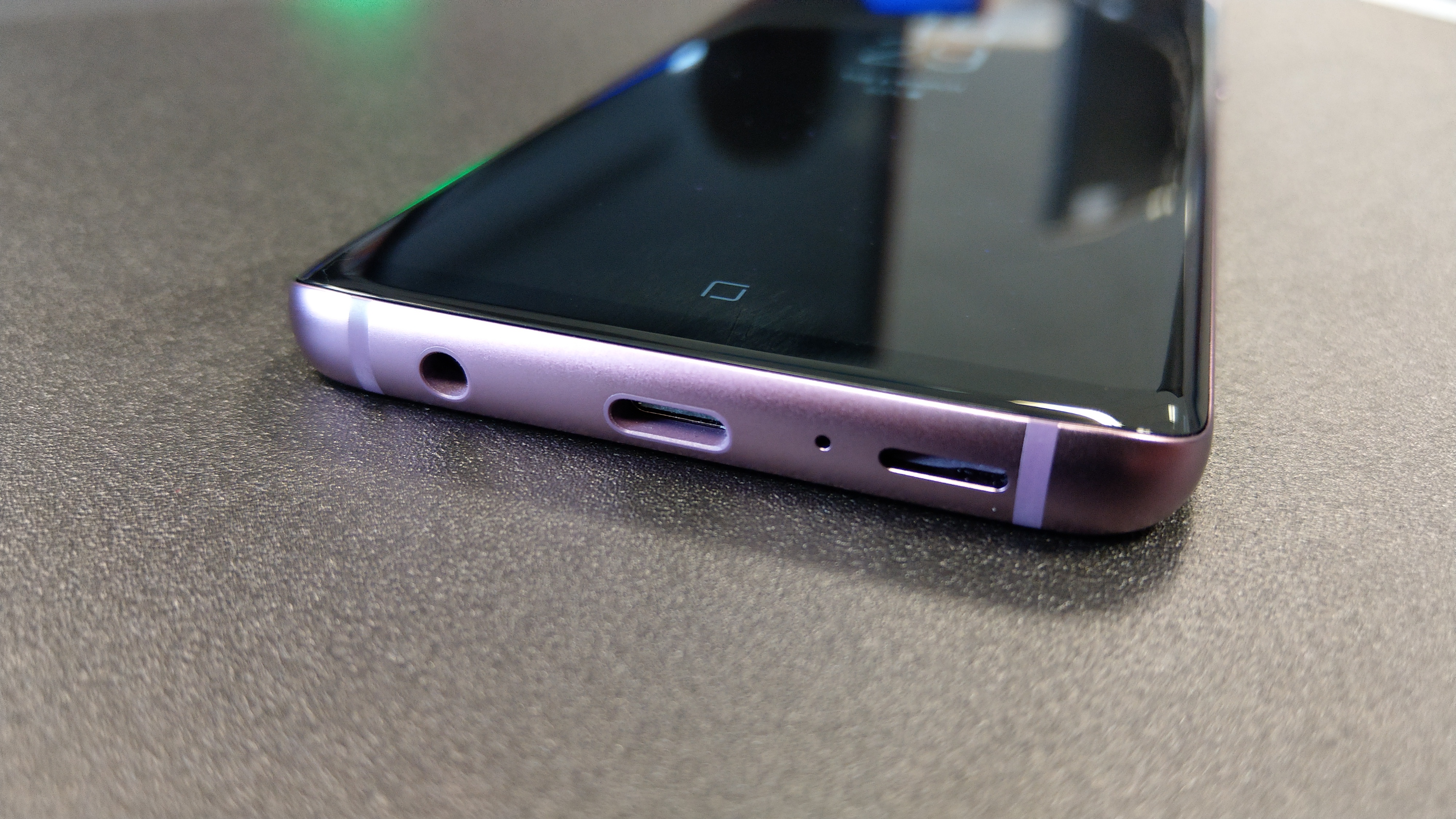
The Galaxy S9 has retained a headphone jack.
Take a quick glance at the Samsung Galaxy S9 and you'd be hard pushed to differentiate it from last year's S8. It isn't identical, though.
The phone is slightly wider and heavier than the S8, and the top and bottom bezels have also been shrunk a little more, producing a slightly shorter device in the hand.
Also, there is a new colour to choose from as well, Lilac Purple, which is the scheme we've been using during our testing period. This is an attractive new colour in our eyes, successfully exuding an exotic and premium aesthetic.
Other changes to the Samsung S9 are equally small-scale. For example, the phone's Iris scanner hole has been hidden in the top bezel, producing a cleaner overall look, while the Samsung Galaxy S9's fingerprint scanner has been shifted to beneath the phone's dual-aperture rear camera.
From our extensive testing of the Galaxy S9 we can confirm that this new central positioning of the fingerprint sensor is a small but marked improvement. Reaching around the phone with your finger is simply easier and more natural, and you also make less finger-on-camera mistakes as with the S8.
Samsung S9 review: screen and hardware
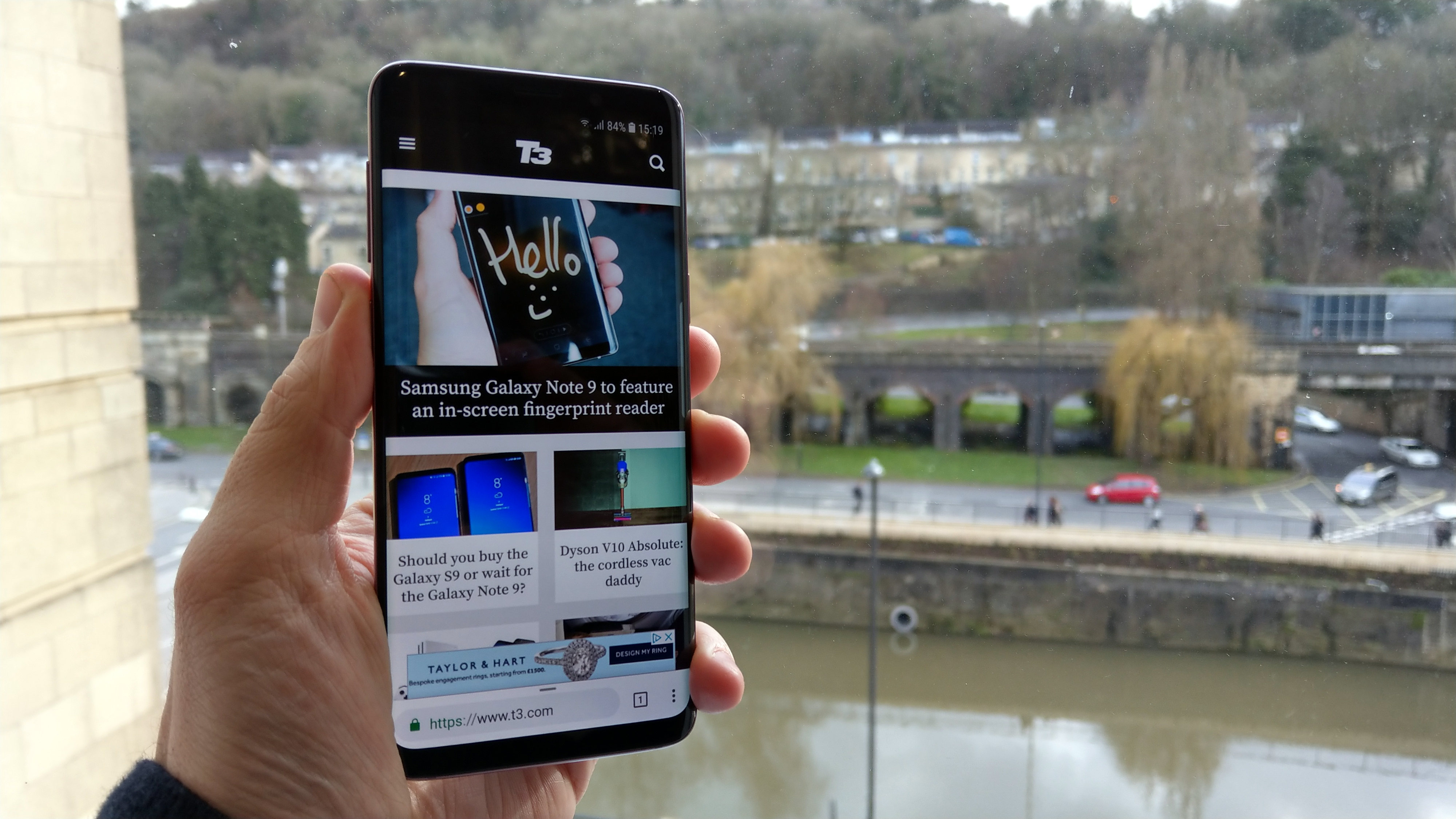
The S9's 5.8-inch QHD+ Super AMOLED screen is superb.
Yes, we said it once, and we'll say it again: the Samsung Galaxy S9 has the exact same display as the Samsung Galaxy S8. It's the same 5.8-inch QHD+ Super AMOLED screen with 18.5:9 aspect ratio, and it is the same Infinity Display, too, meaning that 90 per cent of the phone's front is pure panel. Those now standard but still gorgeous curved edges are also still in residence.
And, guess what? It is still an absolute stunner. Yes, Samsung hasn't given the Galaxy S9 a new screen, but when the S8's was so good and way, way beyond the competition (even now), what does that matter? The Samsung Galaxy S9's screen is just fantastic and it makes viewing photos, playing games and watching films an absolute pleasure.
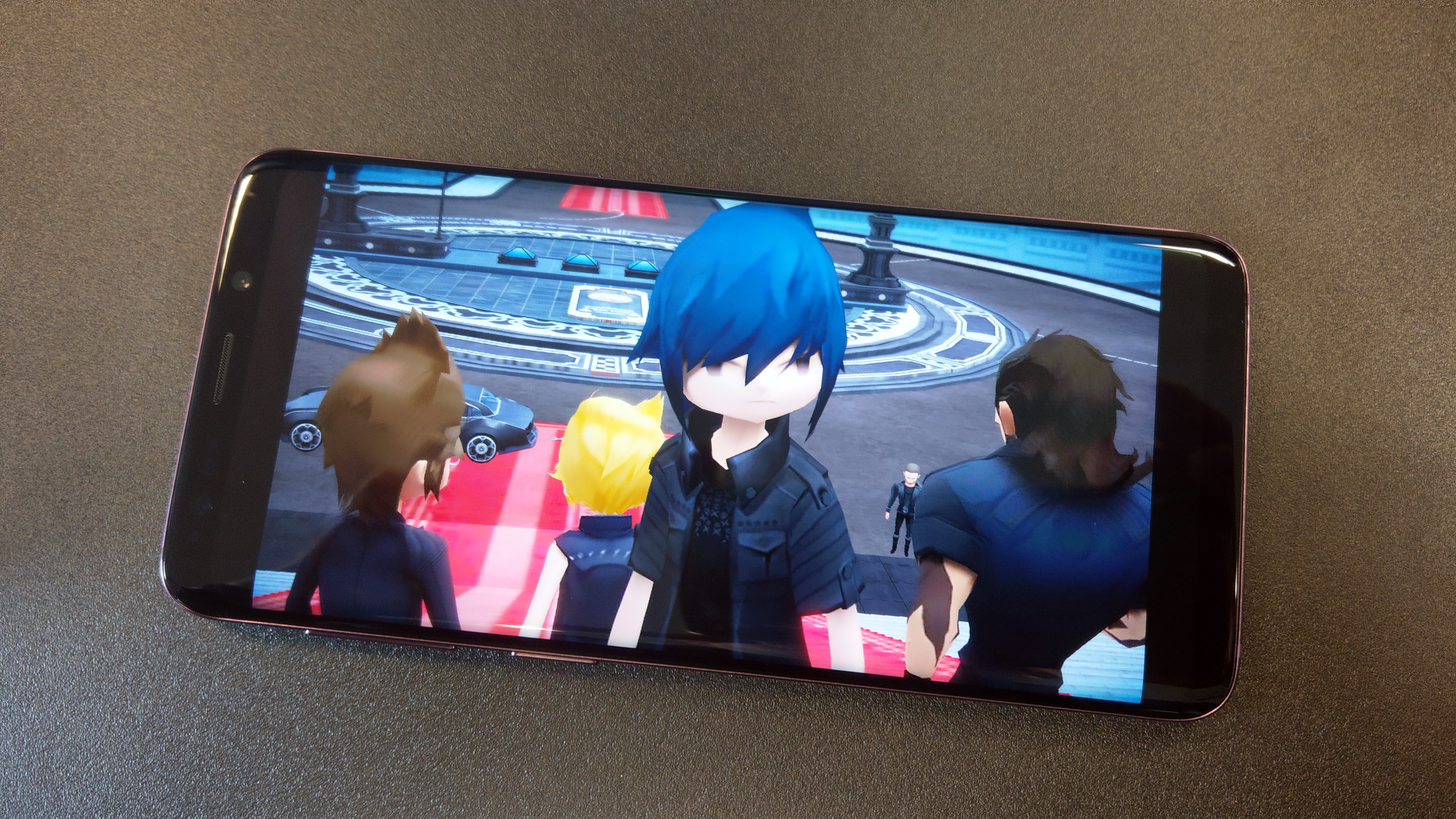
Playing games like Final Fantasy XV Pocket Edition is a slick and immersive experience on the Samsung Galaxy S9.
What Samsung has done that is new is tweaked the screen's landscape mode, meaning that the whole user interface now rotates to fit the widescreen format, meaning that you can easily respond to messages and post to social media while still enjoying your media.
Considering how much time you spend with your phone in a landscape orientation, such as when watching videos on YouTube, playing mobile games, or taking pictures and videos, this is definitely a small but every-day-useful new addition to the S9's repertoire.
In terms of internal hardware spec, the Samsung Galaxy S9 comes equipped with 4GB of RAM (the S9+ has 6GB), 64GB of internal storage space and its new Exynos 9810 processor (well, everywhere except the US market, who are getting Qualcomm's Snapdragon 845 CPU).
This hardware package delivers a very fast and responsive user experience on the S9, with menu navigation incredibly smooth and app loading rapid. Playing demanding smartphone games like Tekken, Hearthstone and Final Fantasy XV Pocket Edition is a no-compromise joy on the S9 thanks to that CPU and RAM combo, while the 64GB of internal storage, while rather standard now, does deliver plenty of room for music, movies, games and images.
And, naturally, with the S9 supporting microSD cards up to 400GB in size, if you do demand more space then upgrading the phone's storage capability is cheap and easy. For example, a cursory glance at a few popular online stores shows that you can bolt in, say, a 128GB of additional storage space for around £20.
Samsung S9 review: camera
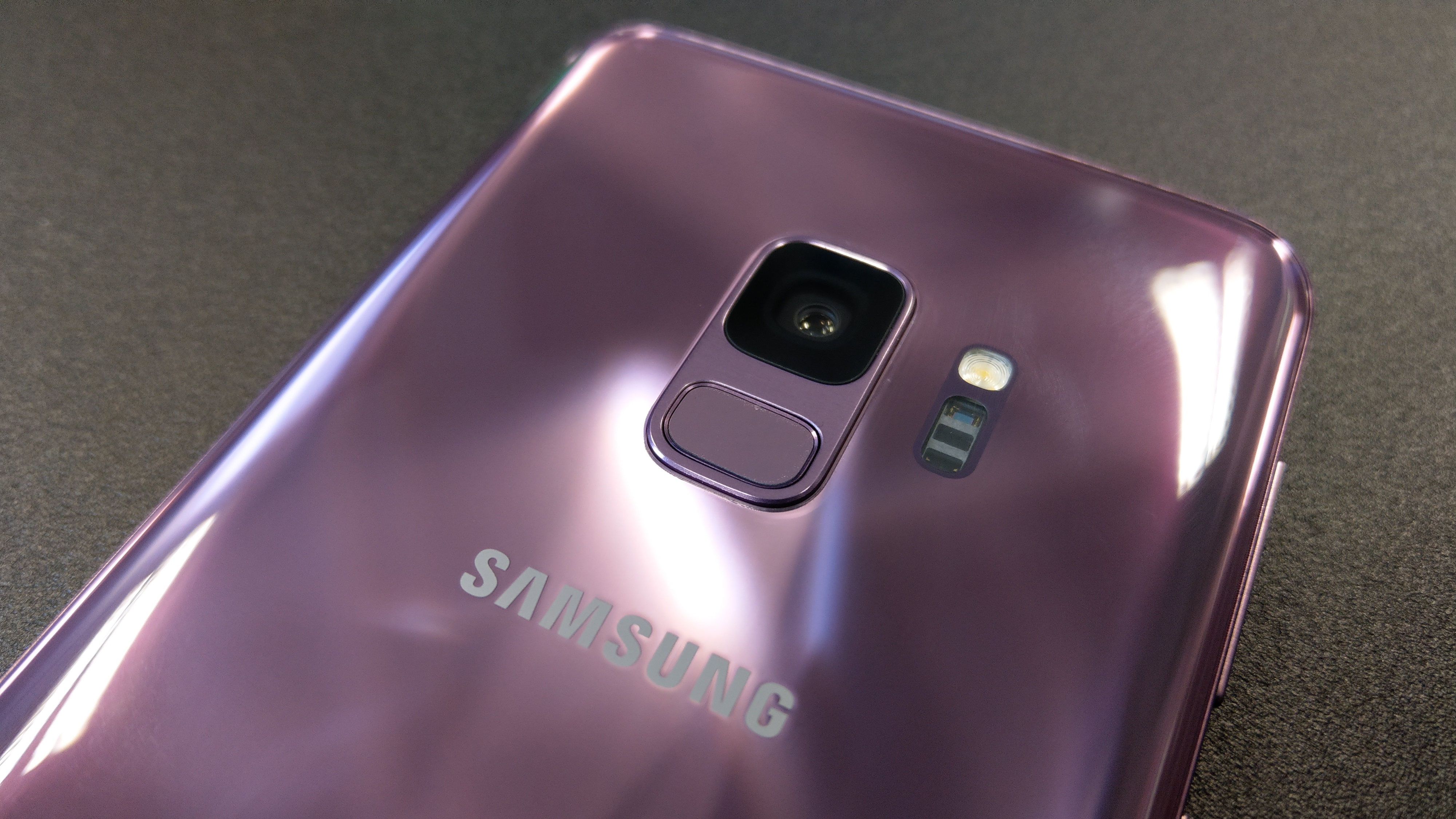
The Samsung Galaxy S9 features a 12MP rear camera with dual-aperture technology.
This is the big takeaway from the S9. The new 12MP rear camera features Samsung's dual-aperture technology, something that allows for far better low-light photography. The system works by ditching a fixed aperture (common in smartphones) for one that can expand and contract like the iris of a human eye. This means that the S9's camera automatically lets in more light to its sensor when the surrounding environment is too dark, and then less light when it is too light.
The rear camera's super slow-motion video capture has also been improved, with the Samsung Galaxy S9 now capable of recording at 960fps at 720p, and 240fps at 1080p (see below video for an example). Neatly, these slow-mo modes now come packing Motion Detection technology, meaning that all the user has to do is hold the phone up to the thing they want to record in slow-motion, with the camera then automatically beginning to record when it sees any motion in the capture field.
We've been very impressed with the quality of slow-motion footage captured on our Samsung S9 review unit, which can be easily turned into a video, gif or even live wallpaper for the phone. We're also impressed with the accuracy and speed of the automatic motion detection, which takes away a lot of the pain of timing things correctly.
It is important to note, though, that for the super slow-mo modes you do need to keep your S9 very still in order for the automatic motion detection to activate. Naturally, the stiller the phone the better the recorded video quality too. We got best results when using super slow-mo by having the phone placed on a solid, flat surface, or resting our shooting arm on a wall or support.
In terms of general shooting with the Samsung Galaxy S9 (some sample images can be seen below) we were impressed with the S9's photo-taking capabilities. The phone's lower or flat-light capabilities in particular stood out (both in on the front and back cameras), as too its raw speed in terms of snapping. The quantity of shooting modes also remains incredibly impressive and the S9's portrait mode, which allows you to take selfies with a blurred background (thereby focusing the shot even more on your beautiful mug), very effective.
We're not sure the S9's shooting system is exactly the "camera reimagined" from a pure photo-taking point of view, but it is a system without equal in many conditions and applications. Auto mode returned surprisingly good results, even though when shooting into light sources we did still get degrees of wash out, while Manual mode offers chance to tweak a myriad of settings if you have the knowledge and skill to do so. And, with the ability to switch between an aperture of f/1.5 and f/2.4, you now have more options than ever to craft great shots.
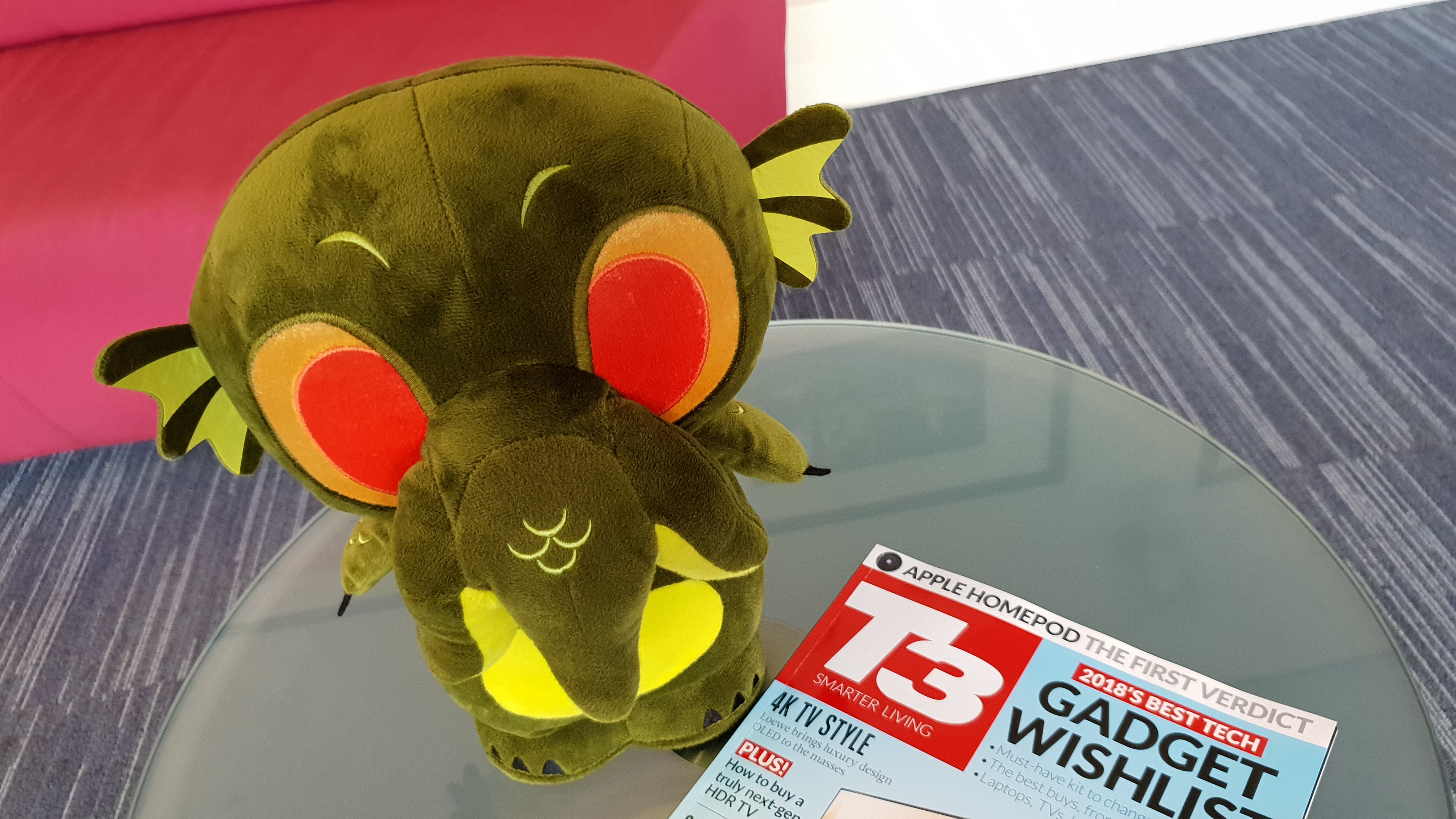
Samsung Galaxy S9 camera sample image gallery

Samsung Galaxy S9 camera sample image gallery

Samsung Galaxy S9 camera sample image gallery

Samsung Galaxy S9 camera sample image gallery
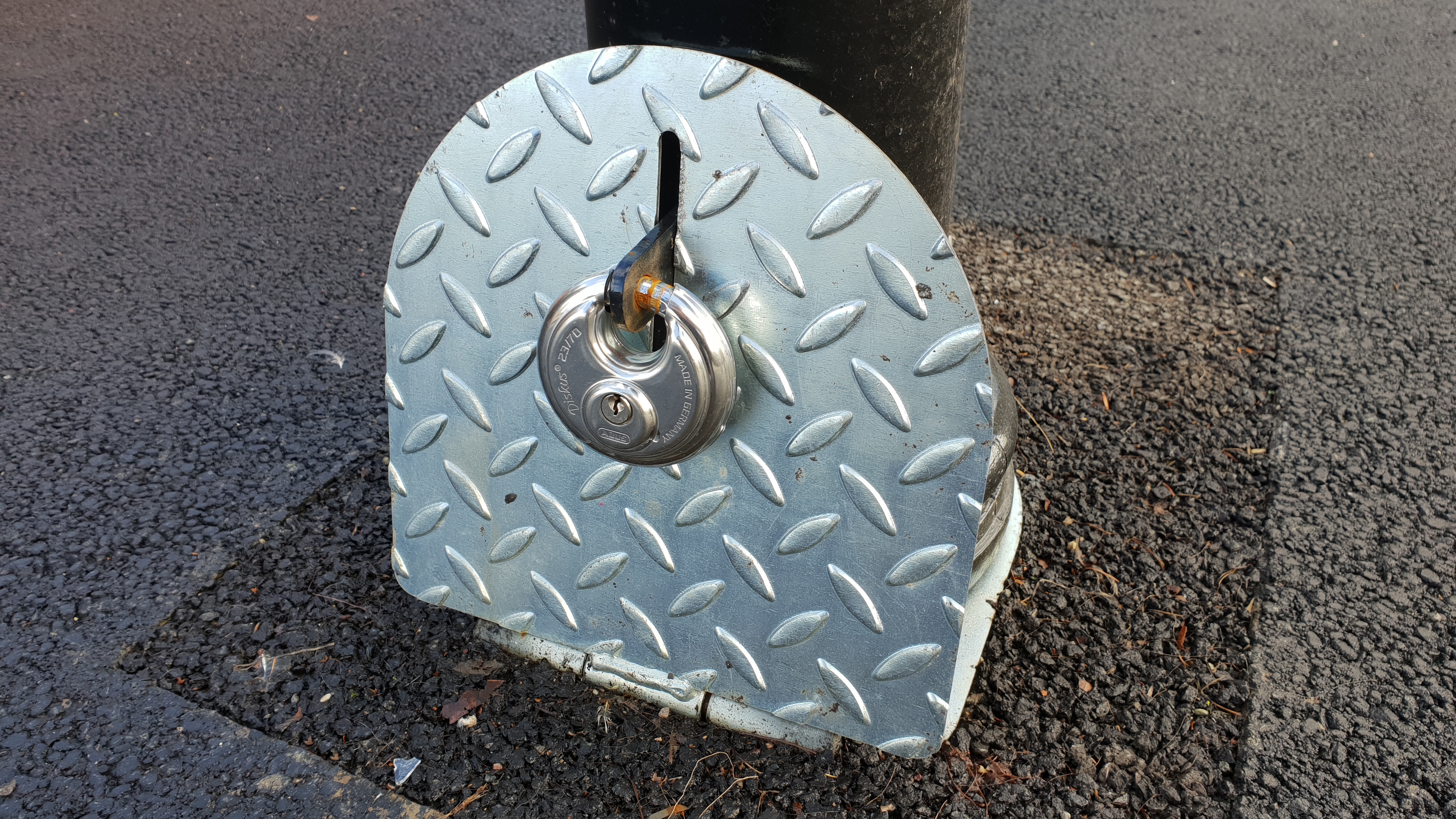
Samsung Galaxy S9 camera sample image gallery

Samsung Galaxy S9 camera sample image gallery

Samsung Galaxy S9 camera sample image gallery
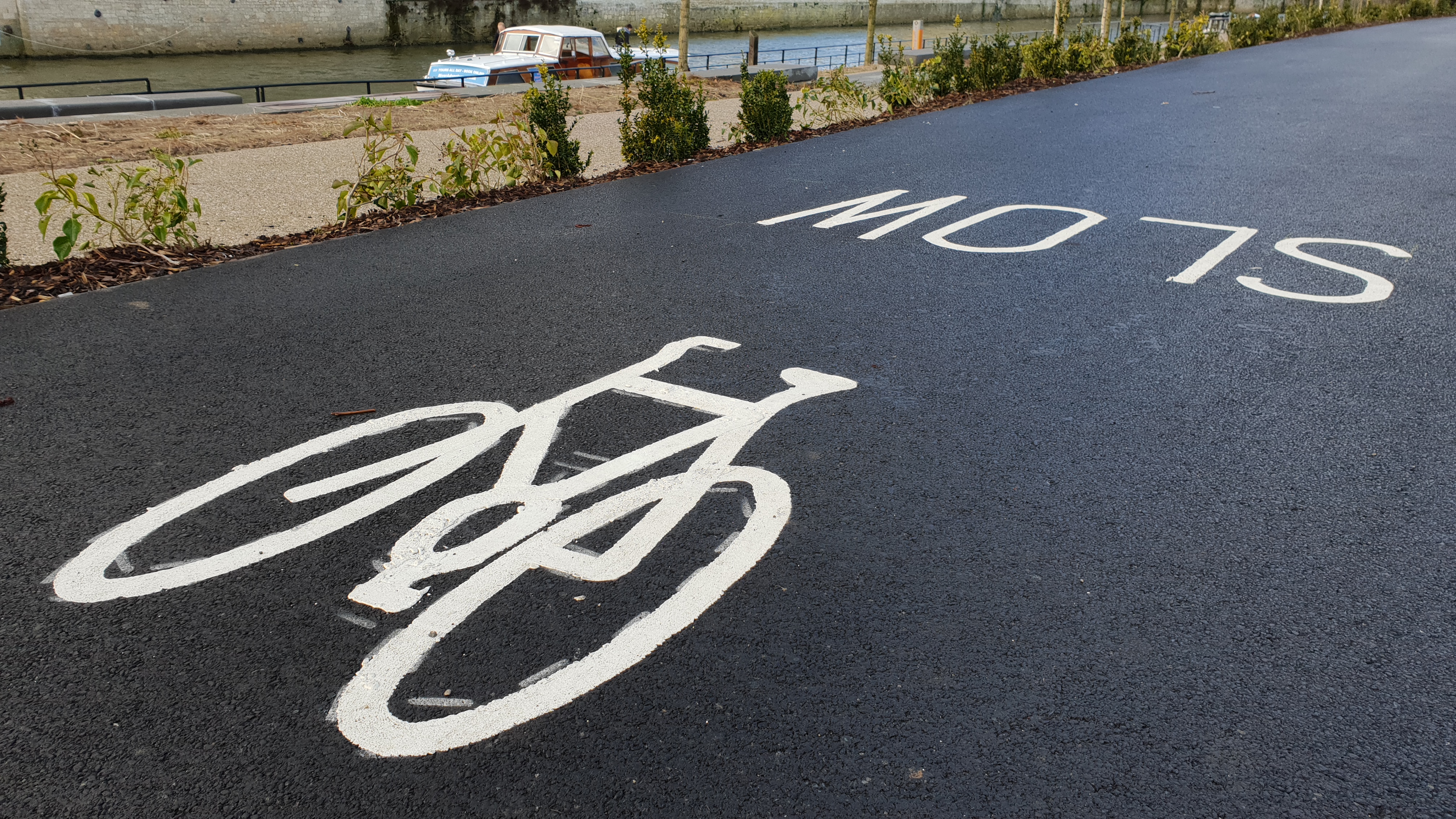
Samsung Galaxy S9 camera sample image gallery

Samsung Galaxy S9 camera sample image gallery
While the Samsung Galaxy S9's 12MP rear dual-aperture camera and front-mounted 8MP camera aren't exactly "the camera reimagined" in terms of pure image taking, they are also absolutely crucial in terms of bringing users the S9's other innovative new features this year, AR Emoji and Bixby Vision, which arguably do show how Samsung has reimagined how smartphone cameras will be used moving forward.
Samsung S9 review: AR Emoji and Bixby AI assistant
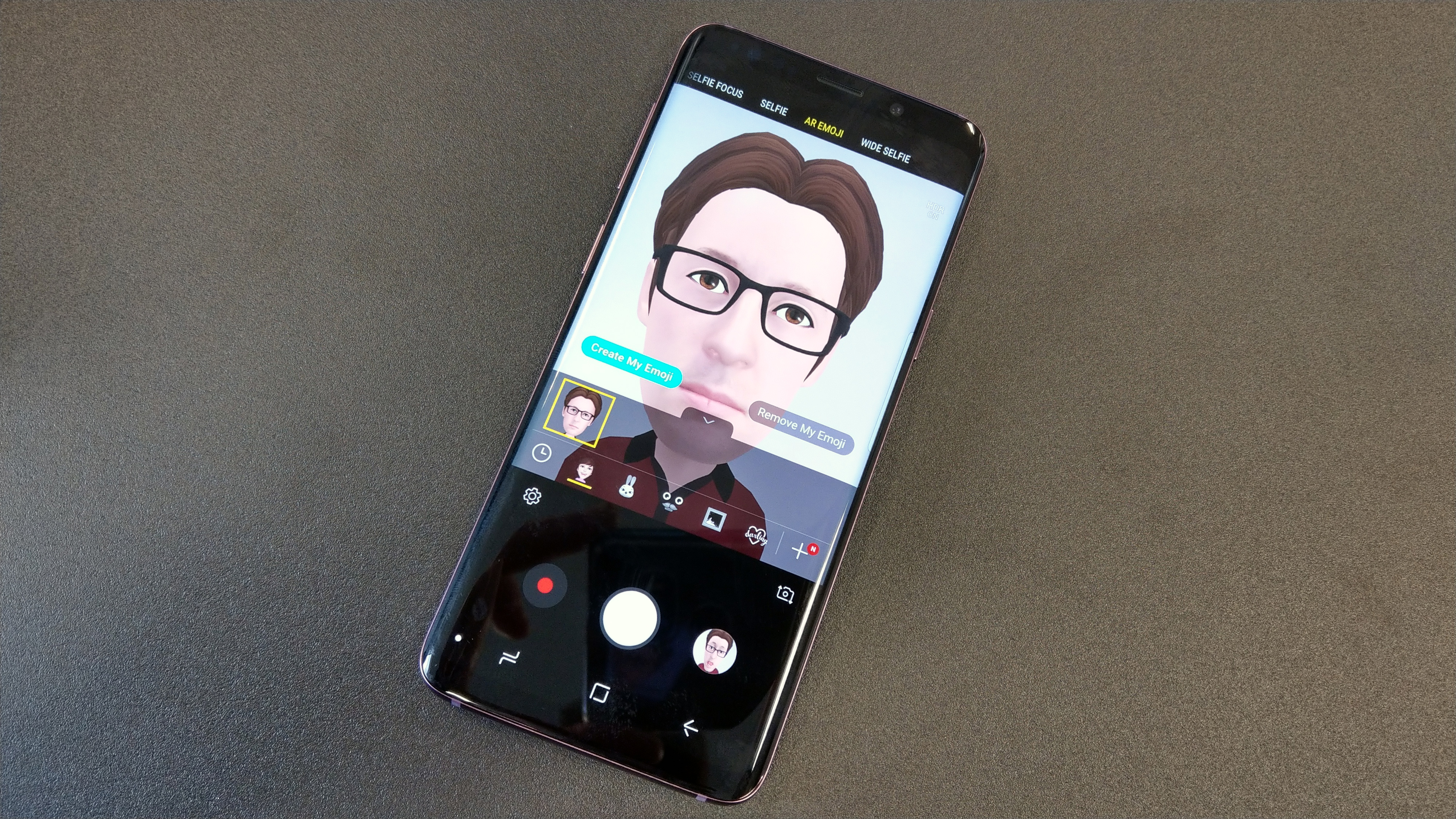
Creating AR Emoji is fast and easy, with the function built into the S9's camera menu.
Apple was onto something with Animoji on iPhone X it would seem, as Samsung has brought its own version to the Samsung Galaxy S9 – AR Emoji.
AR Emoji is a feature built into the system's camera application that allows a user to take a selfie of their face and then have it turned into a virtual avatar of them, one that the user can then dress and style as they choose.
The system works by analysing the 2D image with a data-based learning algorithm, which maps out over 100 facial features to generate a 3D model that can reflect facial expressions and emotions.

Say hello to one of T3.com's AR Emoji avatars.
You can then pose the AR Emoji by holding the camera up to you (as if you were taking a selfie) and the AR Emoji will mirror your expression and pose. At this point you can then take a picture of your AR Emoji, or record a video with sound of you speaking, with your avatar mimicking your actions. These videos are then saved as gifs for ease of sharing on your social or messaging application of choice.
You can also select from 18 different stock expressions if you just want to fire back a stock response to a message. Neatly, these are embedded into the Samsung keyboard, meaning you can bring them up and add them just as easily as regular emoji.
Multiple different AR Emoji can be created and stored on the Samsung Galaxy S9, too, with the whole process – providing you don't dilly-dally too long selecting the perfect hat – taking about 20-30 seconds or so.
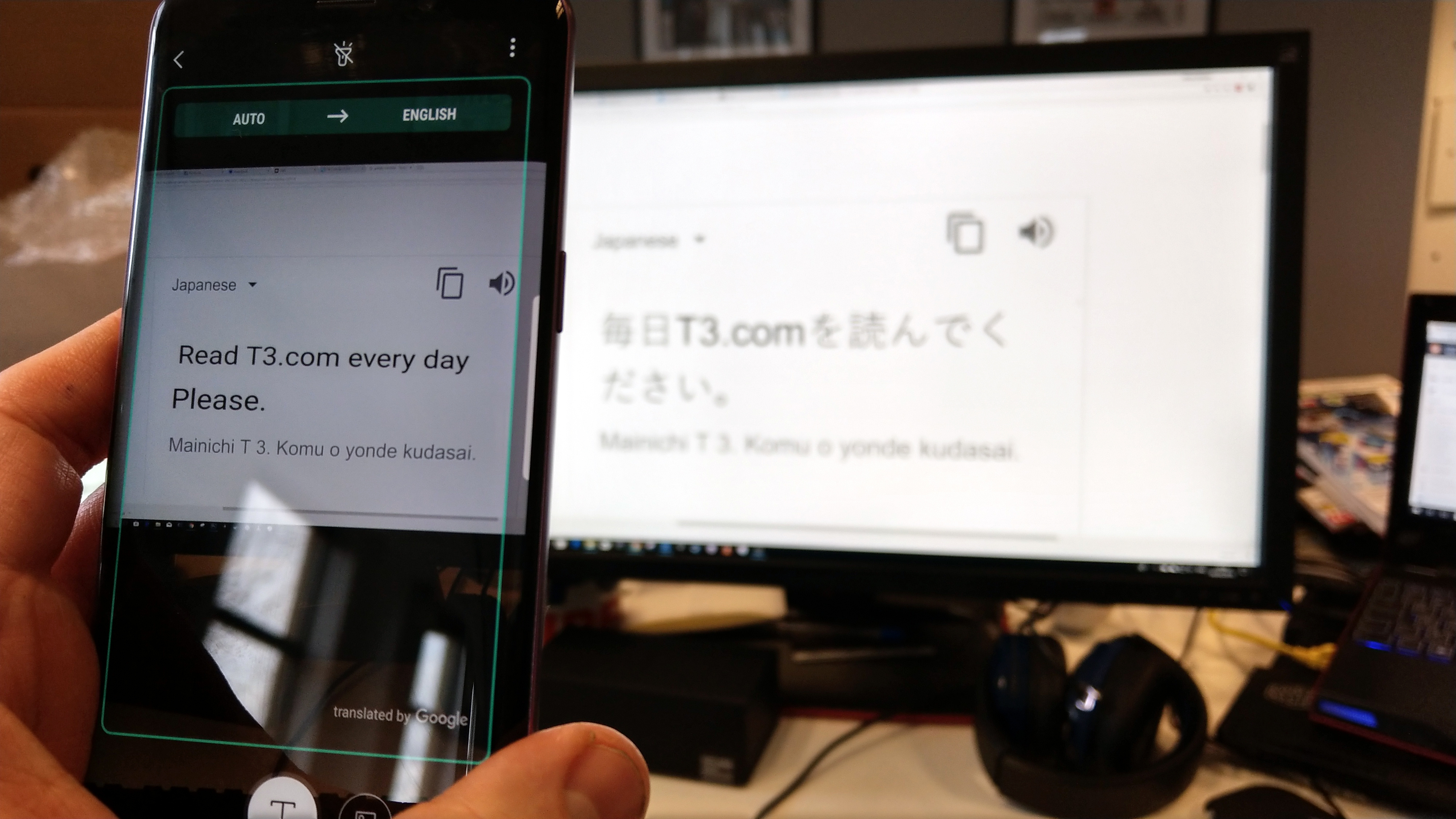
Bixby is very fast at translating foreign languages and does so live.
Like one of Bertie Wooster's chums from the Drones Club, Bixby is back again in the Samsung Galaxy S9, and this time he's extra tanked up.
That means Bixby now has a live translation mode that allows you to simply point the phone's camera at a piece of foreign text (see above image as an example) and Bixby will automatically translate what it says to you on screen.
From our testing of Bixby Vision we can confirm that, on the whole, it works well, with the S9 automatically translating foreign texts in a variety of fonts and sizes quickly and accurately.
It seems slightly faster than Google Translate, too, however it is important to remember that Bixby Vision isn't hardware based, meaning that you do need a data connection for it to work, and the faster your connection the faster Bixby will get a shift on.
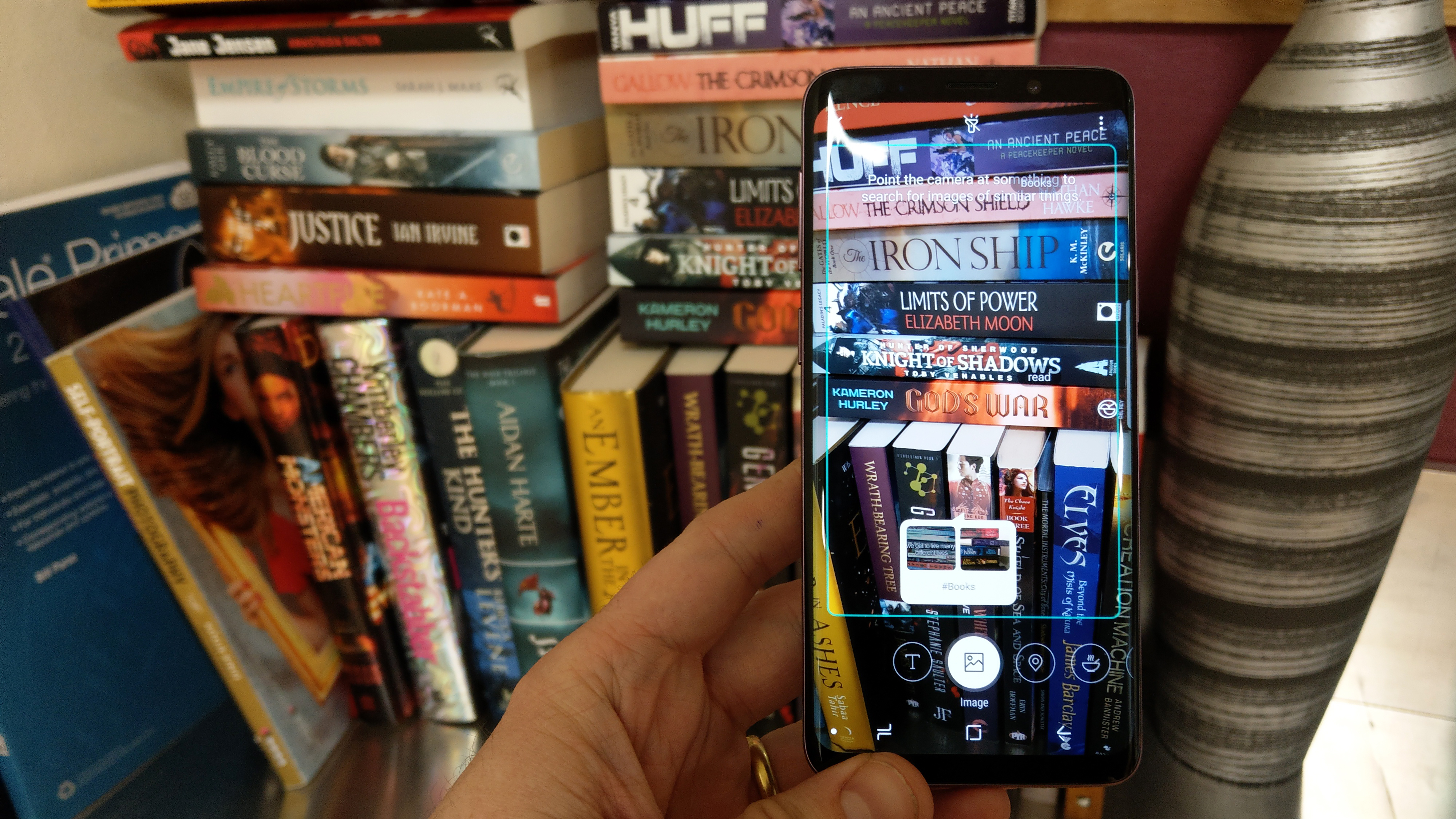
Bixby Vision can identify almost anything you point it at, including places, objects, food and wine, before supplying you with more information.
Elsewhere, Samsung has also built out Bixby's AR capabilities, meaning that it can supply even more information about foods, monuments, locations and more, and Bixby is also location-aware.
These various specialities are selected in Bixby Vision simply by sliding between modes, as you would when selecting a camera mode, and then pointing the S9's rear camera at the thing you want information on.
And, yes, for those of you who want to scan barcodes on every item you come across, you will be pleased to hear that Bixby Vision caters to your needs.
Samsung S9 review: audio, battery, software and security
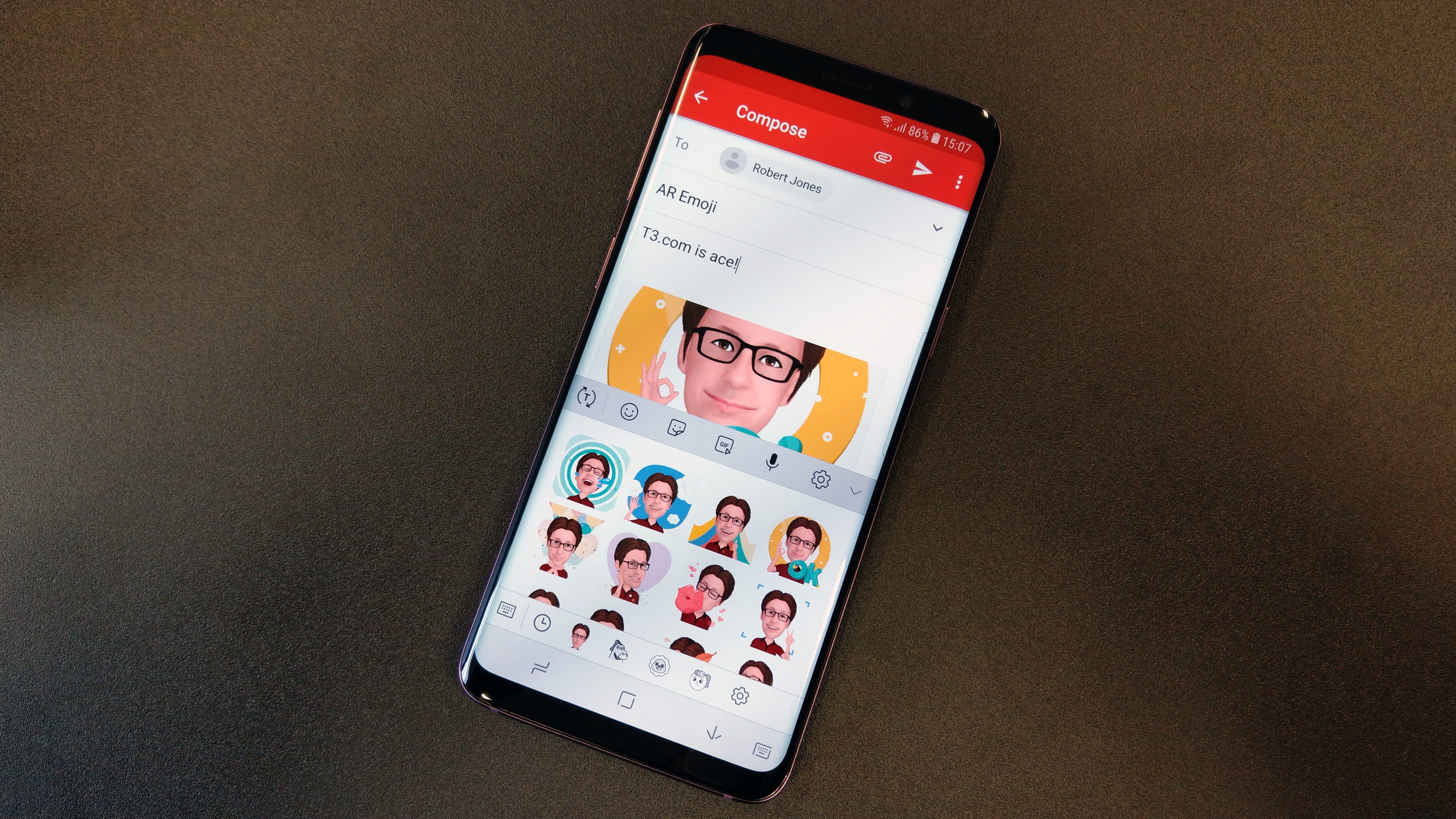
Users can select from a series of pre-set AR Emoji gifs or create their own.
The Samsung Galaxy S9 comes with the same 3,000mAh battery as was included in the S8 and, we've got to admit, this is the one area where we are disappointed with the lack of hardware movement. The S8's battery was by no means poor but, as in all smartphones at the moment, battery life is the one aspect that we really feel has stagnated recently.
From our testing period we can confirm that the S9's battery is more than good enough to get you through a day on medium-to-heavy usage. However, we wouldn't expect anything more from the phone and the so-far elusive 48-hour or more battery we a crying out for remains in hiding - this is a day's usage battery for all but the most lightweight users.
And that is disappointing, really, as the S9 is so powerful and its screen is so lush that you just want to use it all the time, especially to take and consume media, which naturally are the most battery-sapping activities.
Wireless charging is in residence again in the S9 and, to its credit, Samsung remains one of the only makers to make phones compatible with both the Qi and PMA standards. This means that the Galaxy S9 will charge on any wireless charging pad you can buy.
In terms of charging, the S9 also features fast-charge capabilities, meaning you can get almost 40 per cent charge into the phone in just 30 minutes, too.
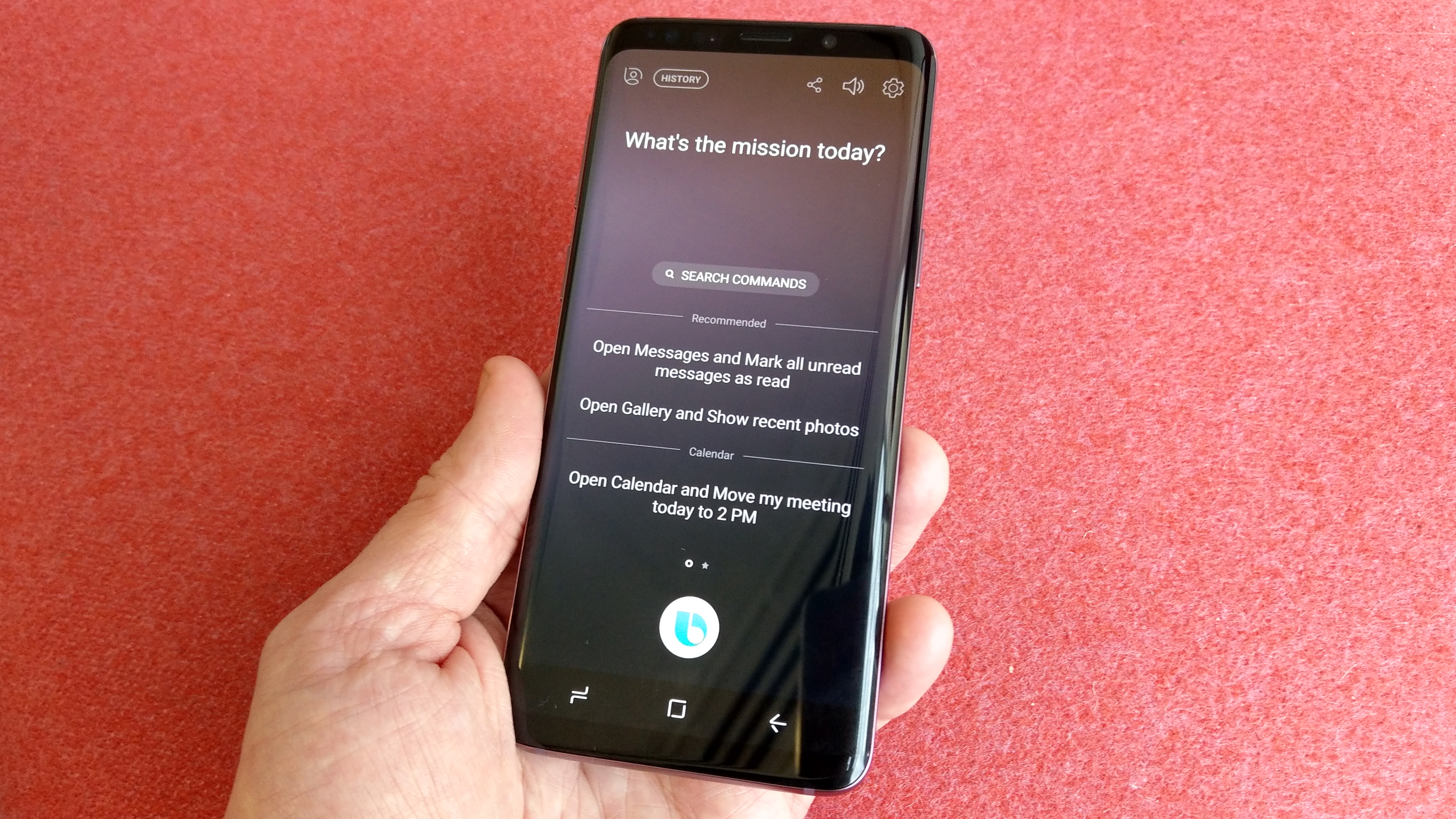
Bixby is capable of taking selfies, sending messages to friends, and opening apps, among many other things.
Audio on the Samsung Galaxy S9 is dealt with by a set of new stereo speakers tuned by AKG. These speakers come loaded with Dolby Atmos 360 degree audio capabilities, too. Dolby Atmos obviously is designed to improve compatible media, however, on the S9 it will also amplify and enhance definition on any media file.
From our ears-on time with the S9 we can confirm it doesn't struggle in terms of volume, and definition is enhanced on standard MP3 tracks when Dolby Atmos mode is activated. The 360 degree audio also works with a compatible source and does add to the immersion, however, it is obviously nowhere near as precise and defined as a proper wired Atmos setup.
As with last year's S8 smartphone range, both the S9 and S9 Plus support Ultra High Quality Audio Playback, too, so audiophiles can rest easy.
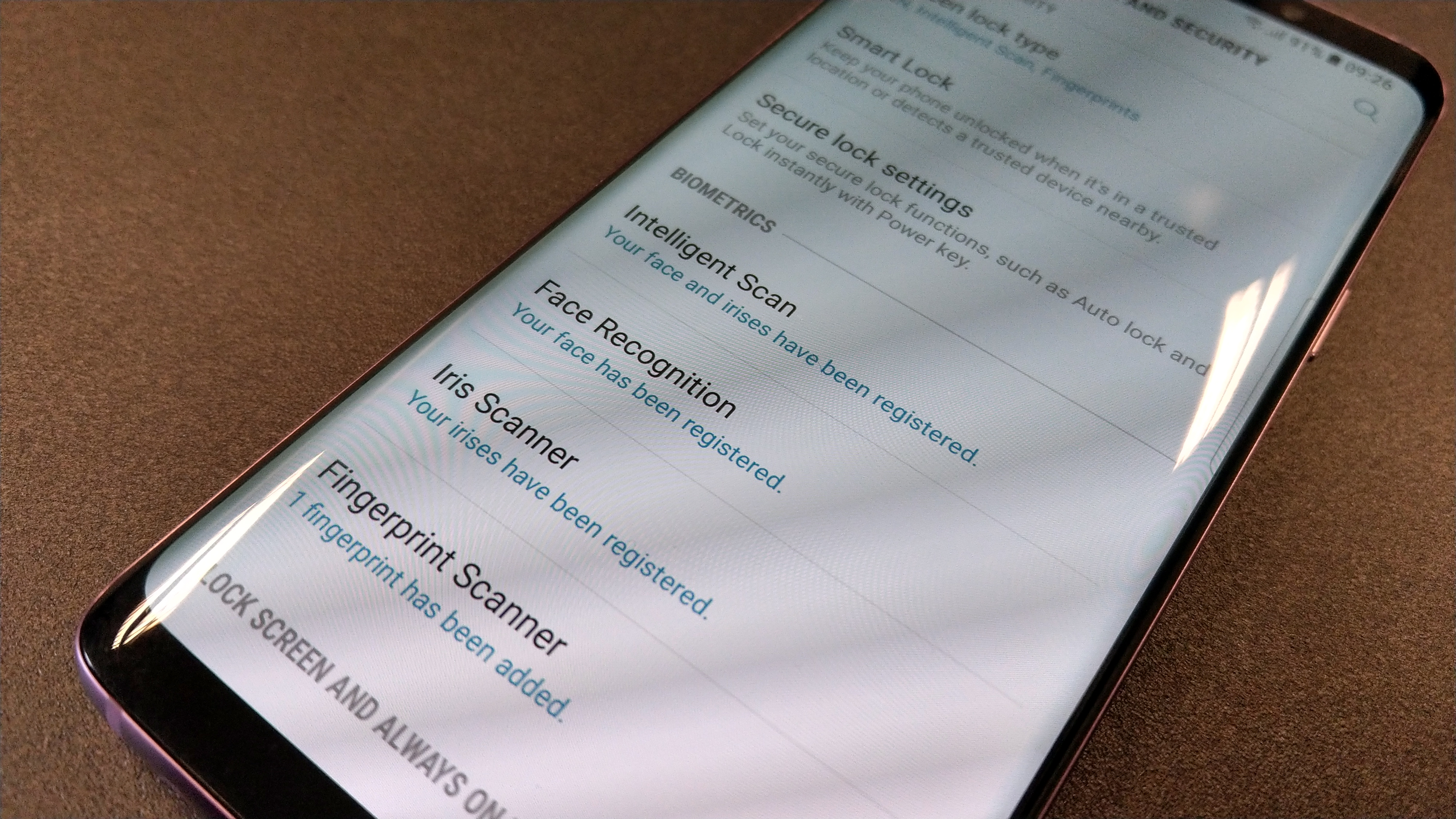
In terms of device security the S9 definitely has you covered, with it offering face recognition, iris scanning, and fingerprint scanning capabilities. The first two of these security measures can be use separately or combined into the S9's Intelligent Scan feature, which allows you to unlock your phone by simply looking at the screen.
We've used Intelligent Scan for a while now and 95 per cent of the time it works perfectly, with a red scanning light momentarily flashing as our face and irises are scanned, and then the S9 immediately unlocking.
Intelligent Scan can only be activated though if you have setup a back up pin or pattern security measure though, and you can also dictate that upon device power on you require the backup security measure to unlock the phone.
Finally, the Samsung Galaxy S9 comes loaded with Android 8.0 Oreo, which runs incredibly fast on the device, with buttery smooth system and menu navigation, as well as zero crashes during our testing period.
Samsung S9 review: verdict
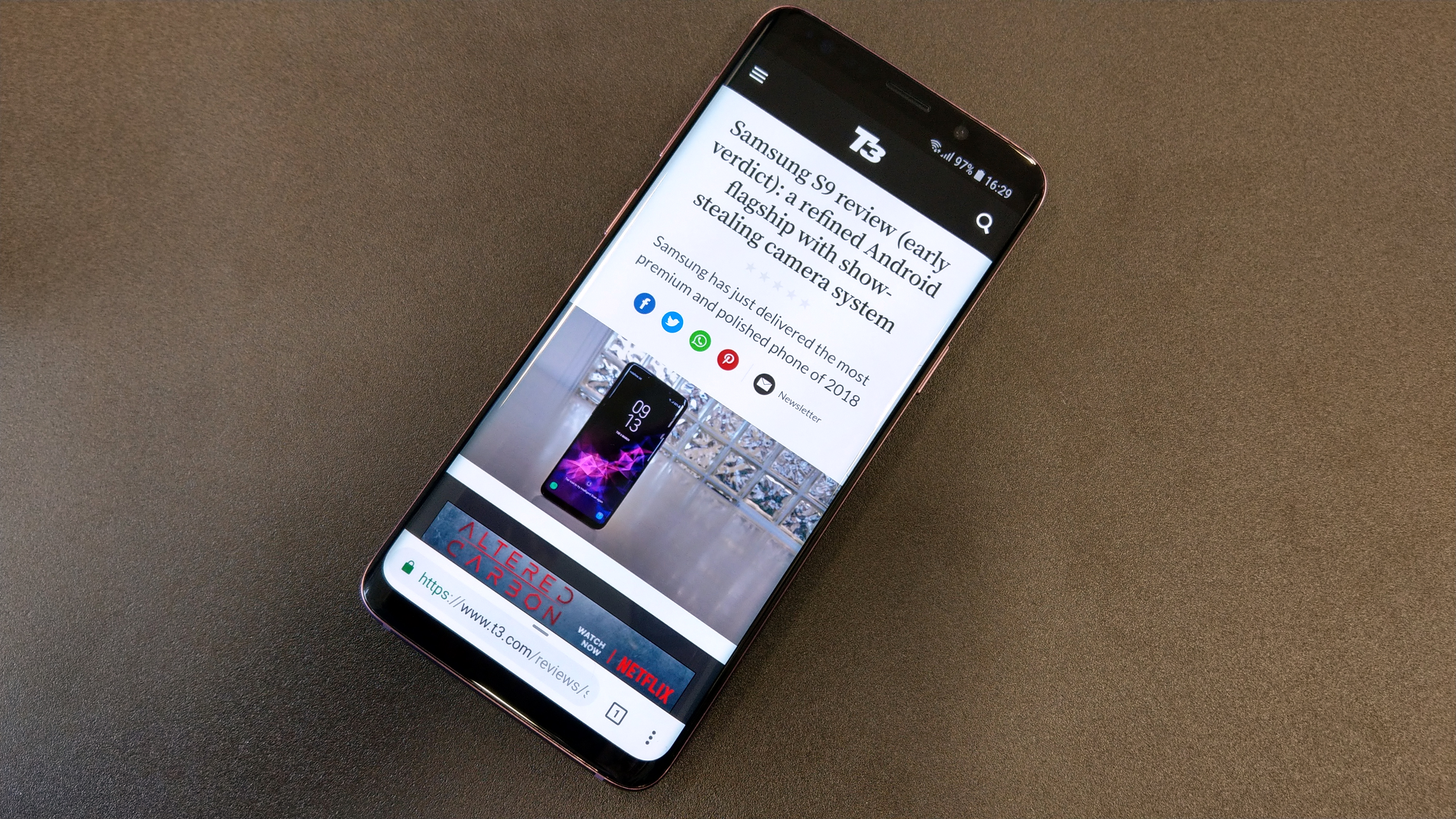
Samsung has always produced awesome flagship Android phones from a pure hardware point of view. Just look at last year's Galaxy S8, which not only blew all other Android phones released at the time out of the water but, in many cases, is only now been caught up with (we're looking at you, HTC U11+) by competitors in terms of performance.
What it has, arguably, always never quite managed is syncing that powerhouse hardware with a holistically fluid, approachable, and interconnected user experience – something that Apple, despite lagging behind in terms of hardware, is a master of.
Samsung has been like a DJ operating a top-level set of decks connected to the best sound system money can buy, but one forgetting that it is the journey that the music takes people on which is the most important part of the overall experience.
What is evident here, though, from our developing impressions of the Galaxy S9, is that Samsung appears to be starting to remix its focus, no doubt thanks to a maturing of vision and renewed confidence in the post-Note 8 world, and it has seemingly done so in a quietly subtle and effective way.
By focusing on how phone communication has moved from the ear to the eye, evidenced by the S9's superb new camera system and gimmick-transcending, system interwoven AR Emoji, Samsung appears to have produced a flagship smartphone that is confident to iteratively tweak its core hardware and then walk away to focus on other, more real-person relevant aspects and features.
Samsung now appears truly confident in its own skin and, by knowing when to walk away from the specification war, at a point where it is already the clear victor, it seems to have granted itself valuable breathing room to deliver a very relevant and on-trend user experience.
Many thanks to Vodafone for supplying T3 with a Samsung Galaxy S9 review unit.
Sign up to the T3 newsletter for smarter living straight to your inbox
Get all the latest news, reviews, deals and buying guides on gorgeous tech, home and active products from the T3 experts
Rob has been writing about computing, gaming, mobile, home entertainment technology, toys (specifically Lego and board games), smart home and more for over 15 years. As the editor of PC Gamer, and former Deputy Editor for T3.com, you can find Rob's work in magazines, bookazines and online, as well as on podcasts and videos, too. Outside of his work Rob is passionate about motorbikes, skiing/snowboarding and team sports, with football and cricket his two favourites.
-
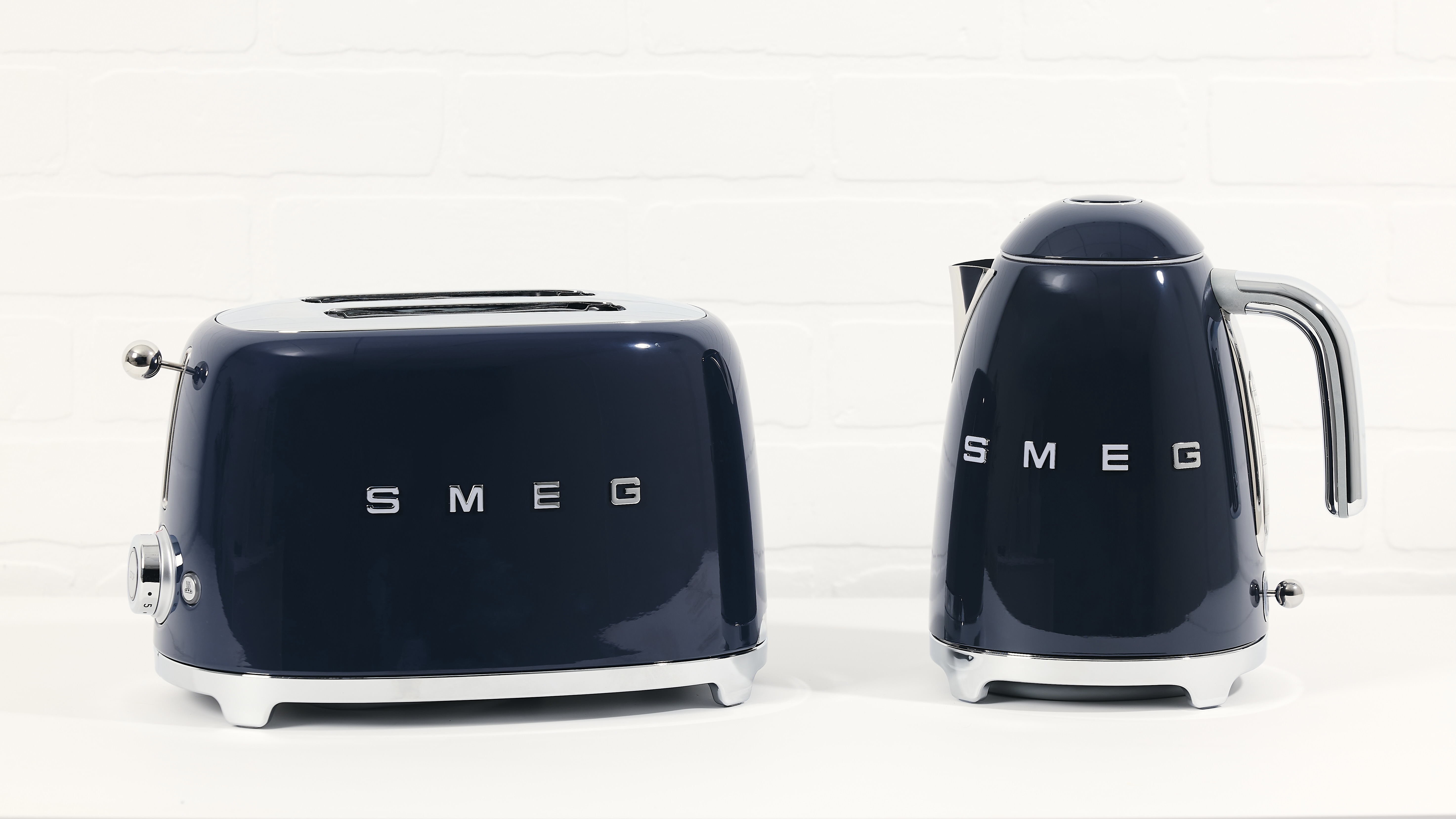 Smeg adds a touch of navy sophistication to its iconic breakfast set
Smeg adds a touch of navy sophistication to its iconic breakfast setIt's a minimalist's dream
By Lizzie Wilmot Published
-
 My most anticipated Netflix movie of the year gets a wild new trailer
My most anticipated Netflix movie of the year gets a wild new trailerHavoc looks pretty unbelievable
By Max Freeman-Mills Published
-
 Forget the tariffs, Paddington 3 is now on Netflix to bring you joy
Forget the tariffs, Paddington 3 is now on Netflix to bring you joyPaddington In Peru is now streaming on Netflix
By Mike Lowe Published